
A soldier sits near a collapsed building in Hatay, Turkey. Burak Kara/Getty Images hide caption

A soldier sits near a collapsed building in Hatay, Turkey.
Burak Kara/Getty ImagesOne week since arriving in southern Turkey after massive back-to-back earthquakes hit the region, our correspondent recounts what she has seen in seven days of covering the tragedy in Turkey and neighboring Syria.
NPR's Ruth Sherlock traveled from Lebanon soon after the quakes hit, and has since reported from both Turkey and Syria. She says thousands of people in both countries are living versions of the same nightmare.
Email us at
This episode was produced by Michael Levitt. It was edited by Larry Kaplow and William Troop. Our executive producer is Sami Yenigun.

 Live Radio
Live Radio